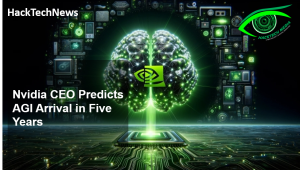
Nvidia CEO Predicts AGI Nvidia’s CEO, Jensen Huang, has sparked a whirlwind of speculation with his latest prediction regarding the future of Artificial Intelligence (AI). Speaking at Stanford University, Huang boldly asserted that within the next five years, AI would be capable of surpassing human performance in every conceivable test. This proclamation comes hot on the heels of Nvidia’s pivotal role in advancing AI technology, notably through their collaboration with OpenAI on projects like ChatGPT.
Huang’s statement hinges on the notion of achieving Artificial General Intelligence (AGI), a milestone that has long been the Holy Grail of AI research. He posited that if AGI is defined by the ability to outperform humans in tests, then we are on the cusp of witnessing its realization. According to Huang, AI is poised to excel in a myriad of assessments set forth by the computer science community.
“If I gave an AI … every single test that you can possibly imagine, you make that list of tests and put it in front of the computer science industry, and I’m guessing in five years’ time, we’ll do well on every single one,” he confidently stated during his address.
The Evolution of AGI
Artificial General Intelligence, often abbreviated as AGI, represents a paradigm shift in the realm of AI. Unlike narrow AI systems that excel at specific tasks, AGI aims to emulate the breadth and depth of human cognitive abilities. While some herald AGI as a harbinger of unprecedented progress, others caution against the potential pitfalls of unleashing such powerful technology.
Huang’s assertion aligns with a growing discourse surrounding the implications of AGI. With luminaries like Microsoft CEO Satya Nadella emphasizing its transformative potential, the debate over AGI’s societal impact continues to intensify. Nadella, for instance, views AGI as a catalyst for global progress, akin to the Industrial Revolution in its scope and magnitude.
Challenges and Controversies
However, the road to AGI is fraught with challenges and controversies. Scientists grapple with deciphering the intricacies of the human mind, a task that remains elusive despite significant strides in neuroscience and cognitive psychology. Furthermore, defining clear objectives for AGI poses a formidable hurdle for engineers, who rely on precise metrics to drive innovation.
Huang’s remarks underscore the complexity of the AGI endeavor. While he expresses confidence in AI’s capabilities, he also acknowledges the multifaceted nature of AGI’s development. As technological advancements outpace our understanding of human cognition, the pursuit of AGI enters uncharted territory.
Future Prospects and Considerations
Looking ahead, the convergence of AI and AGI promises to reshape industries and societies on a global scale. From revolutionizing healthcare to optimizing resource allocation, the implications of AGI are far-reaching and multifaceted. However, with great promise comes great responsibility, as stakeholders grapple with ethical, legal, and existential questions.
In conclusion, Jensen Huang’s bold prediction serves as a clarion call for the AI community to redouble its efforts in pursuit of AGI. Whether AGI arrives within five years or remains a distant horizon, one thing is certain: the journey toward artificial general intelligence is as exhilarating as it is unpredictable. As humanity stands on the precipice of a new era, the quest for AGI embodies the timeless pursuit of knowledge and innovation.
